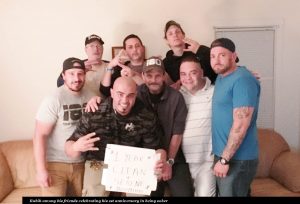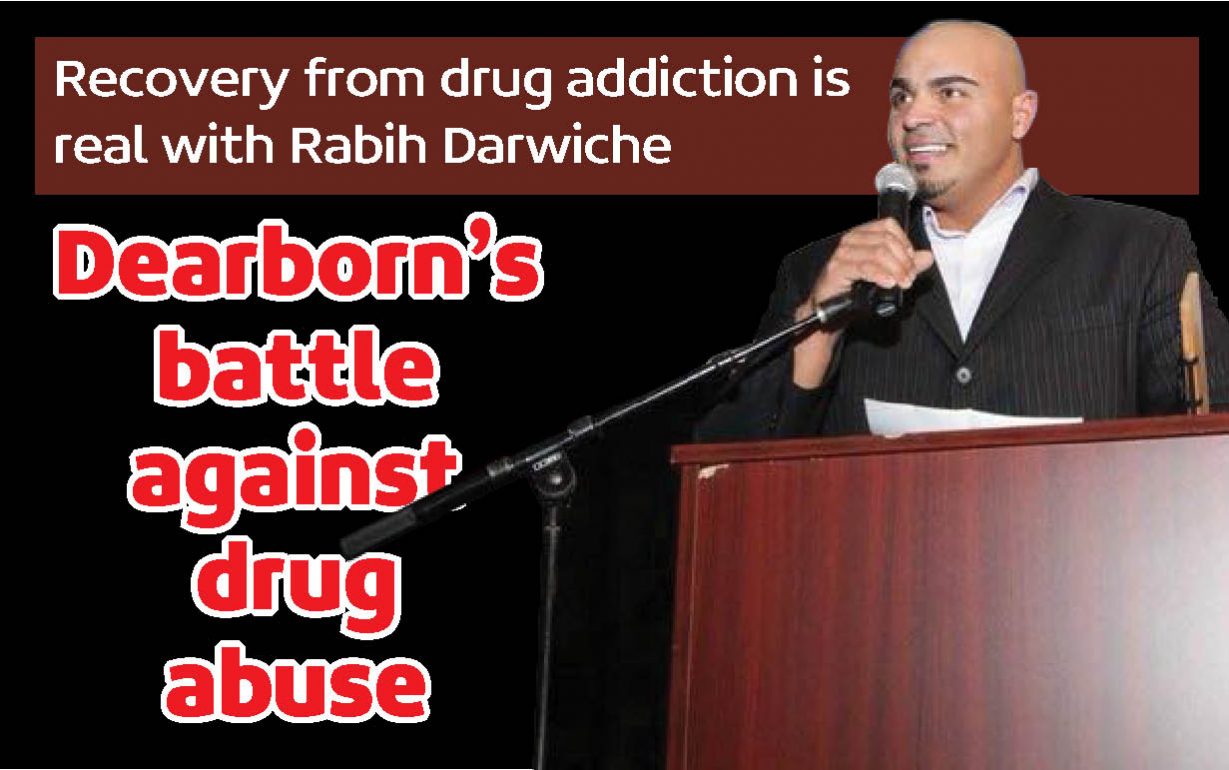Dearborn’s battle against drug abuse
Rabih immigrated from Lebanon at age six with his family to the United States to live with his parents in East Dearborn. He attended Lowery School and then Fordson High School. He was the youngest of his 7 other siblings. Rabih lived a normal life like any Arab American child living to Dearborn until he was drawn into the “wrong circle” as he describes it.
Special Report
The Yemeni American News
Our reporter Adel Mozip sat down with Rabih Darwich, now Hype Athletics Wayne Center Building Manager and a recovered healthy individual for an interview.
Rabih says “It all started in my early teens, I became aware of my surroundings; seeing many students smoking so after a cycle of watching the same scene, my curiosity led me to smoke my first marijuana at age 14. I then became addicted to alcohol after being pressured by my peers. We used to smoke after school, by the gas station, and backyards”
Peer pressure was imminent in dragging Rabih into the circle. “They tell you flat out. If you’re not with us inhaling then you can’t be part of us.” Rabih went through high school being addicted to all kinds of drugs. “When I was 19, I injured myself playing basketball, and I was then addicted to prescription drugs such as Vicodin, Suboxone, Xanax, and others.”
The addiction got worse. He says “my family wasn’t understanding why I was acting. Addicting got me stealing money, I burnt many bridges along the way. I never went to jail until I was 30 after not paying insurance, and getting a DUI. I wasn’t normal anymore.”
 Rabih details his story one night where he overdosed with one of his friends. “It was a Sunday football game day and I took two doses by mistake.” He says that he collapsed in front of his house after taking many pills. His neighbors called the ambulance and he and his friend were taken to the hospital.
Rabih details his story one night where he overdosed with one of his friends. “It was a Sunday football game day and I took two doses by mistake.” He says that he collapsed in front of his house after taking many pills. His neighbors called the ambulance and he and his friend were taken to the hospital.
Rabih hit his rock bottom; narrating one night after leaving the hospital seeing all the cigarettes in his bed and his elderly mom crying at the edge of the room. Thinking about suicide and coming clean at the same time, he decided to go to rehab for the 23rd time. “People that knew I was addicted didn’t know very much about what I was going through, they were saying something sloppy like ‘grow up’, or ‘love yourself.’” He completed a rehab two-week session and then moved out to a “3-quarter house”. A three-quarter house is a transitional housing unit that provides a lower level of supervision for people who are in recovery. He recalls his first day at one of these houses; where the power went out; temperature around 95 in hot Michigan weather and bed bugs in the house. “While it was a scary scene, at least it was better than my room. I knew that minute that God has something for me and I wanted to live.”
In September of 2016, Rabih saw an ad in the newspaper to work at Hype. He met with Ali Sayed and was afraid that [Ali] will judge him. But to his surprise, “I will give you a chance!”. Ali agreed to hire Rabih knowing that he’s in recovery and Rabih afterward felt that he prejudged Ali, not the other way around.
He tells me “I started off as maintenance, and I am his building manager. I do vocational training for people in recovery, autistics, and people. My mission is to serve the people. Now I have some roommates. I do intervention now, we tell them that stigma needs to end. People should not be shy to ask for help.”
He says that parents go through rough times when they have an addicted child. “This is extremely uncomfortable for them; the child would go back to the house. Parents actually would enable them.”
Asking Rabih on how faith plays a role in the recovery process. He said, “ You have to find faith; It doesn’t matter who you believe in; as long as you’re believing in a higher power.” Rabih says that unfortunately, [religious] scholars are lacking the understanding of addiction.
Rabih explains his journey to Mecca, “God gave me strength and when I went to Hajj because the struggles I went through in my life, and the stress; the struggle I was experiencing sober in full reality. I was understanding the concept of being alive. I asked God when I saw the Kaba’ah for the first time is to help me help the people. I was asking for forgiveness, and it was an incredible feeling. Most of the fear got replaced with faith, and I knew at that moment the purpose of life .”
Rabih became an active part of SAFE, Substance Abuse Coalition, a project of Hype Athletics which is designed to combat addiction in the community knowing the stigma associated with addiction.
Headed by Hassan Abdallah, SAFE is founded on three aspects: education, advocacy, and services. Abdallah believes the cultural taboos and stigma associated with substance abuse by giving people the freedom to speak out when they or a loved one need help.
SAFE has partnered with Dearborn schools and community organizations to do a peer-mentoring program to spread awareness about the dangers of drugs. Abdullah says “Team SAFE began its Life-Skill Drug Prevention and Education Program within the Dearborn district – within 3 days, our SAFE Mentors covered 36 classes (all classes in grades 3-8 at McCollough/Unis). Our goal is to cover each 3rd-8th-grade classroom at least twice before the end of the school year. We will begin at Stout and Woodworth Middle School after mid-winter break. The kids and staff were engaged, excited to learn, and empowered with the knowledge to make positive life decisions. Some of our mentors even taught the classes in Arabic to accommodate non-English speaking students.
SAFE is committed to giving the kids in our community every resource possible to prevent harmful life situations and to become leaders for SAFE in the future.”
Now there are many initiatives in the Arab American community combating substance abuse. One organization, in particular, Life for Relief and Development is empowering a drug-free community coalition (DFC) of committed individuals and organizations who work together to reduce the substance abuse problem and its negative impact. Headed by Dr. Abdelwahab Alawneh, the program identified problems; hookah and marijuana. Three focus groups were held with youth in the spring of 2016 to learn more about Hookah, 30 youth participated. “The results were alarming, 25 out of the 26 surveyed believe that hookah is safe to smoke, 22 reported that their parents allowed them to smoke hookah but not cigarettes, all participants reported that is easy to get hookah at home, friends. 11 participants reported that using marijuana is safe and has no negative health consequences.”
Dr. Alawneh says that the coalition is launching “Parents Against Marijuana (PAM)” in collaboration with Smart Approaches to Marijuana (SAM). “SAM headquarter is in Virginia and is the world’s largest organization focusing on defeat legalizing marijuana. The other partner is Productive and Healthy Michigan organization which is leading the effort to defeat legalizing Marijuana in Michigan.”
Life for Relief and Development is working closely with the Islamic Center of Detroit in launching seminars and education to the parents to combat substance abuse and opioids.
The Islamic Center of America in partnership with SAFE, HYPE Athletics and Access will be hosting a half-day Community Forum on Saturday, March 17th at the Islamic Center of America.
The American Moslem Society (AMS) is also embedding Life’s program into the programming of the mosque’s services. Dr. Mahdi Ali, President of AMS says educating parents is very important; bringing experts to explain ways to help parents became aware of the drugs’ problem.
Asking Rabih for an advice to people who are addicted, “get honest with yourself and have mercy. In order to be free of drugs, you would have to endure. Please don’t be ignorant, educate yourself, by helping. You’re not alone, and we have many people that actually care. Reach out to help.”












